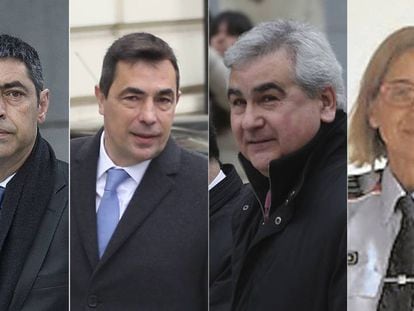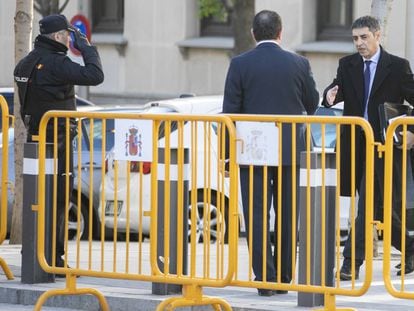Former Mossos chief seeks to distance himself from Catalan independence leaders
This week saw the start of the High Court trial of four figures from the regional police force involved in the events of 2017
/cloudfront-eu-central-1.images.arcpublishing.com/prisa/KL2VZT6ST2TXF6CESCFULMASUI.jpg)

This week saw the start of the second major trial covering the events of the fall of 2017, when pro-independence forces in the northeastern region of Catalonia organized a referendum on secession from Spain, and the Catalan parliament passed a unilateral declaration of independence.
Facing trial in the Spanish High Court, the Audiencia Nacional, are four former chiefs from the Catalan regional police force, the Mossos d’Esquadra. They are accused of having played a “key role” in the pro-independence drive and are facing charges of rebellion and sedition.
Last year saw the Supreme Court trial of the pro-independence leaders involved in the 2017 secessionist drive in Catalonia. That case concluded with nine politicians and civic association leaders given lengthy prison sentences for offenses including sedition and misuse of funds.
The key defendant in this case is Josep Lluís Trapero, the then-chief of the Mossos d’Esquadra. He was sacked from his position in 2017, after four years in charge of the regional force, in the wake of the central government taking over the regional powers in Catalonia under Article 155 of the Constitution, a measure that was implemented after the unilateral declaration of independence was passed.
Also on the stand are Pere Soler, who at the time of the independence drive was the general director of the Mossos, which is a political appointment; César Puig, the former secretary general of the regional interior department (also a political appointment); and Teresa Laplana, a Mossos officer in charge of the security detail at the Economic Affairs Department during the search on September 20.
In a trial that will run until March, the four defendants are accused of working in line with the then-regional government’s “route map” aimed at achieving “the secession of Catalonia from the rest of Spain.”
The public prosecutor is calling for up to 11 years in jail for Trapero, Soler and Puig for the charge of rebellion, while Laplana is facing a four-year prison sentence for sedition.
On Monday, Trapero faced the first of two days of questioning by the public prosecutor, Miguel Ángel Carballo. During his testimony, he sought to distance himself from the political leaders of the secessionist drive, saying that he felt “uncomfortable” with some of the decisions that the regional government took in the fall of 2017, as well as certain motions passed by the Catalan parliament, which he classed as an “outrage.”
For more than five hours on Monday, Carballo sought to demonstrate that the Mossos had not taken action during the weeks prior to the illegal referendum, and on the actual day of the vote itself. But Trapero rejected each of the accusations made by the public prosecutor.
“To speak about passivity… I cannot accept that,” Trapero told the court. “You cannot infer that we didn’t want to do anything,” he added, in reference to the regional police force’s actions on September 20, when a crowd of 40,000 protestors had surrounded the regional Economic Affairs Department as the Civil Guard tried to carry our a court-ordered search to look for material relating to the planned referendum. “I’m putting myself on the line for the [police] chiefs who were there and the chiefs from the force,” he said. “We did everything we could and everything we were ordered to,” he said about the Mossos’ actions on October 1, the date of the illegal referendum on Catalan independence, despite criticisms the officers did nothing to stop the vote from happening.
Trapero insisted that he mobilized all available officers on October 1, and that they had carried out their duties in the prior days. But Carballo was not to be convinced. “But what did you do?” the prosecutor asked. “Did you set up any police unit, any specific investigation, when you became aware that illegal actions were going to take place, and it was your duty to stop them from happening before a judge tells you to do so?” The former Mossos chief replied by saying that a different Mossos department would have to answer that question.
Trapero also sought to make it clear that he was not aligned with the regional government, claiming that on a number of occasions he complained about the situation that the force had been put into and how it could damage the image of the Catalan force. “I felt uncomfortable. Very [uncomfortable],” he explained. “On a number of occasions I said to the ministers what it was that they were doing, where they were headed.” What’s more, he stated in court, he warned his political superiors that the Mossos would not break the law. “The Mossos will always do what judges tell them to,” he said, emphasizing the fact that he “did not have a close relationship with Carles Puigdemont,” the then-premier of Catalonia.
Trapero also rejected accusations that he was working in tandem with Jordi Sànchez, the former leader of the pro-independence ANC civic association, and one of the men who organized the protest on September 20 outside the Economic Affairs Department. “He got in contact with me offering to mediate,” Trapero explained, in reference to the phone calls the pair exchanged that day. “But Mr Sànchez did not impose any conditions. He was not in a position to impose conditions.”
Day 2
Tuesday saw the same dynamic between prosecutor and defendant during the second court session of the trial. “Did you think that it could work?” Carballo asked Trapero, about the Mossos approach to stopping the referendum from happening on October 1. “We were particularly careful, not to justify our actions [with the pro-independence sectors], but rather because a spark could have set off a massive blaze in Catalonia at the time.”
The second day of the trial saw the prosecutor analyzing a series of emails and reports that Trapero received, in a bid to use them to prove that the then-Mossos chief was working with the regional government to allow the illegal referendum to take place while making it look as if he was working to stop it.
Carballo even went so far as to throw into doubt Trapero’s claims that a plan had been formulated to arrest then-regional premier Carles Puigdemont should the courts order his detention in the wake of the unilateral declaration of independence passed by the Catalan parliament.
In another document produced by the prosecution, and written in the wake of the September 20 protest, Trapero explains to his officers that they must be “careful with the use of force.” “Was that a way of justifying the light touch at the Economic Affairs Department?” Carballo asked. “No. We had to be careful because police actions that were excessive or that had serious consequences would have been very difficult to manage with the atmosphere in Catalonia [at the time],” Trapero responded.
The prosecutor’s questioning of Trapero finished just after 2.30pm on Tuesday. Today he will face questions from his own lawyer, Olga Tubau, and the rest of the defense team. Then it will be the turn of the rest of the defendants to take the stand.
English version by Simon Hunter.












































